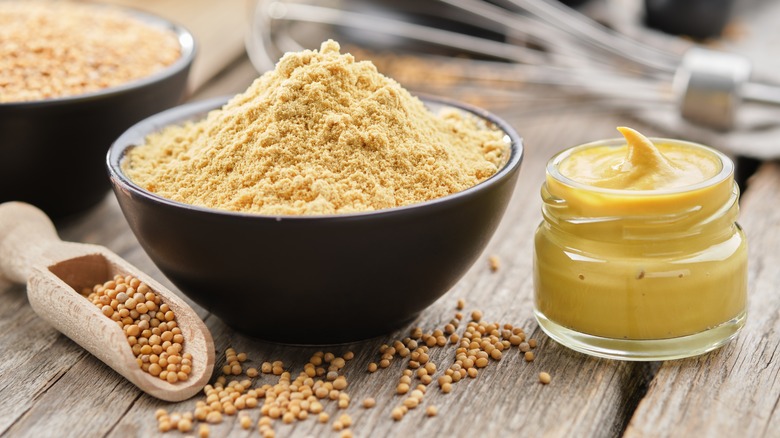Is It Safe To Store Mustard At Room Temperature?
When it comes to flavorful and versatile condiments, mustard is top tier. Maybe you're pairing it with a little mayonnaise on your turkey sandwich or using it to add some acidity and tang to a homemade vinaigrette. Whatever it is, it doesn't hurt to have mustard in the house. But that begs the question: Does mustard need to be refrigerated? The short answer is no, but if you plan to store it for more than a couple months, then yes.
Of course, the base for the spreadable mustard we know and love is mustard seed. This is what gives mustard its iconic spice. It's in the same family as horseradish, but think of mustard as horseradish's slightly milder cousin. Whether you're using Dijon or stone ground, this spread contains other elements, including vinegar and salt, which add a tangy twist and bring out the seed's natural flavors. A few other add-ons might be included for flavor depending on the recipe, but the vinegar and salt are what preserve the mustard well enough to not require immediate refrigeration — as long as the condiment doesn't contain any perishable add-ons, like fruits and vegetables.
Mustard can be stored at room temperature for two months
Acids like vinegar act as natural preservatives because they create an environment that microbes don't like. Vinegar contains acetic acid, which destroys the structure of these germs by chemically altering things like fats and proteins within the bacteria. As a result, germs and mold can't grow or thrive, and mustard contains enough vinegar to prevent that growth. Once the mustard jar is opened, store it in a cool, dark place such as a kitchen cabinet, where it will stay good for about two months.
But refrigeration helps preserve this condiment even more. The cold temperatures essentially add an extra layer to prevent bacteria growth. For that reason, mustard lasts a whole year when it's opened and then refrigerated. So, while it's not necessary to refrigerate mustard, if you have the means to keep it cold and know you'll use it slowly, the refrigerator might be the better option. The spice known as dry mustard, on the other hand, can always be kept in the pantry.

